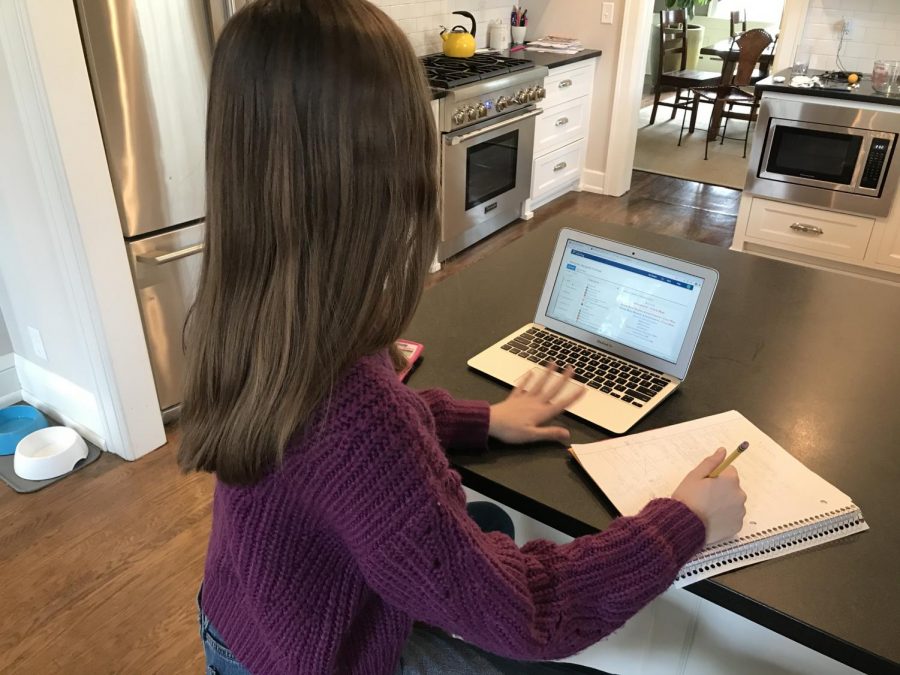Adjusting to online school affects students
8th grader Margaret Frohman completes her online assignments from her kitchen counter.
May 1, 2020
Over the last few weeks, our day-to-day lives have all been drastically changed in one way or another. BSM made the decision to continue the school year online and have students learn remotely for the rest of the year.
Learning like this is very different than usual and can be difficult for students to become accustomed to, but educators have been working to make teaching as effective as possible. “We absolutely can have effective teaching over the internet. Will every lesson be effective for every kid? Probably not. But teachers are trying to incorporate a variety of media to cater to different learning styles,” Director of Learning Support Kristin Gilbertson said.
The transition to online school was very quick, leaving students needing to adapt to a completely new experience. What you’re going through now is similar to what a freshman goes through in college, it’s different,” math teacher Mr. John Groess said.
It may be difficult for students to make this adjustment, but teachers will always be there to help even outside the classroom. “Students who struggle with motivation will still struggle with motivation, but we also have support available for that via Google Meetings. I am excited for the greater level of personalization I will be able to provide my students during this time,” Gilbertson said.
Students with learning differences may have a harder time adjusting than others. “This will disproportionately affect students with learning differences. They will need to work harder to get the help they need by showing up to office hours for clarification. Teachers won’t see them struggle in real-time and the delay could be hard. Counselors and Learning Specialists will be checking in, but it will be much easier to hide the struggle when we are not all together,” Gilbertson said.
Teachers are encouraged to be more creative with how they give tests so that test-taking will remain effective. “Assessment is probably going to look different. We are encouraging teachers to think of different ways to assess students that don’t involve a paper-and-pencil multiple-choice test,” Gilbertson said.
While test-taking and day-to-day school life will be different, studying will remain mostly the same. “Studying though doesn’t change. Using active study methods like quizzing yourself or teaching the material to another person is effective,” Gilbertson said.
Cheating remains an issue. However, teachers can use systems already in place to help stop it. “Cheating is a concern, but we are not reinventing the wheel. There are plenty of online school models to borrow from so we can learn how to mitigate cheating from them,” Gilbertson said.
Teachers may need to change the types of questions they ask on quizzes and tests, to adapt to a new learning environment and prevent cheating. “I think the type of question you have to change. There’s no way for us to stop students from using a calculator or your notes, so you have to change the question,” Groess said.
Though transitioning to online school is difficult, students still need to put in the effort and talk to their teachers about issues they are having. “If a student is struggling with distance learning they should reach out for help. If students wait until we get back to start putting in effort however, their grades definitely could be affected,” Gilbertson said.




































![Teacher Lore: Mr. Hillman [Podcast]](https://bsmknighterrant.org/wp-content/uploads/2025/03/teacherlorelogo-1200x685.png)













